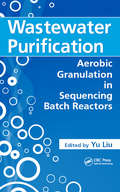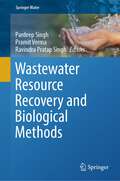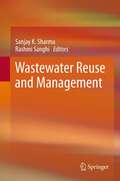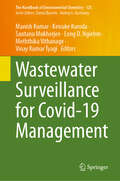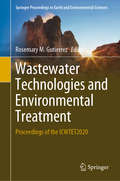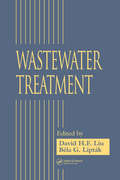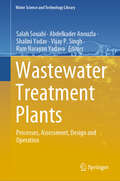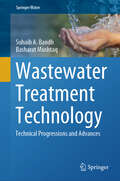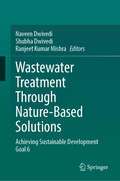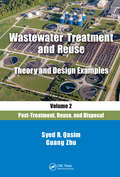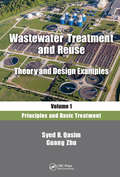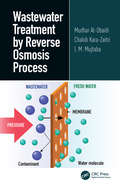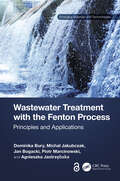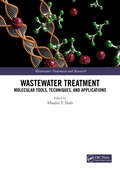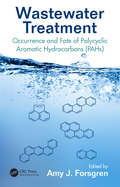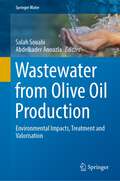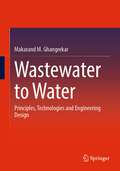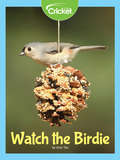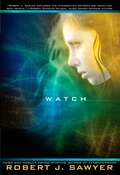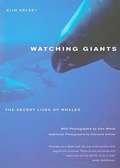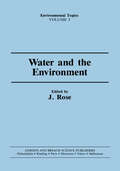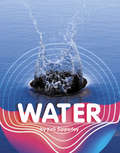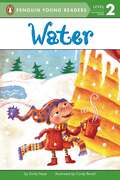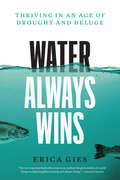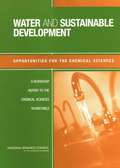- Table View
- List View
Wastewater Purification: Aerobic Granulation in Sequencing Batch Reactors
by Yu LiuA newcomer to the scene, aerobic granulation is on its way to becoming the hot new technology for high-efficiency wastewater treatment. Thus far, intensive research has been conducted with regard to the understanding of the mechanism of aerobic granulation in sequencing batch reactors (SBR) and its application in treating a wide variety of municipa
Wastewater Resource Recovery and Biological Methods (Springer Water)
by Pardeep Singh Pramit Verma Ravindra Pratap SinghThe book is unique in highlighting the issue of wastewater as one of the important environmental issues. The uniqueness also lies in exploring the concepts of converting waste into resources in the form of bioenergy, biofertilizers through various biological methods. Given the international scenario, the chapters of this book are designed to include both anaerobic and aerobic methods of resource recovery from the industrial wastewater. The book is a step toward design with nature and the concept of green chemistry.Waste menace is one of the most voiced and unsolved problems in the entire world. The whole world is facing the threat of water pollution, soil pollution/ land pollution, odour pollution from the growing waste. Though we find many missions and programs at international, national, and regional level to solve the waste associated issues, this is mostly in context with the solid fraction of the waste. Very little is being done to manage the liquid part of the waste or what we call the wastewater.The conversion of wastewater has the potential to be converted to energy in the form bioenergy, bio-fertilizers, electricity, nutrient recovery, etc. The use of sludge as biofertilizers solves the problem of sludge management on the one hand and production of organic crops on the other. The biological treatment methods like sludge treatment gives the farmers the source of biofertilizers and organic manure for the plants. In the present scenario, energy crisis is also one of the issues that we are facing particularly in context with the thermal power plants which are environmentally highly polluting. Through various techniques like microbial fuel cells or biohydrogen, we get a source of cleaner energy. So, through this book, we try to produce the content and information to give the audience an understanding of the waste water as one of the environmental and health issues and mitigation strategies. The book gives a sufficient understanding of how waste can be turned into a resource.
Wastewater Reuse and Management
by Rashmi Sanghi Sanjay K. SharmaOver the past 50 years the volume of wastewater has grown exponentially as a result of the increasing world population and the expansion of industrial developments. Researchers all over the world have been trying to address this issue suitably in order to fight water scarcity; yet, it is only recently that wastewater recycling has caught their attention as an effective and responsible solution. Wastewater is a resource that can be adequately treated to successfully satisfy most water demands as well as decreasing wastewater discharges and preventing pollution. This book presents the studies of some of the most prestigious international scientists and gathers them in three different sections: Wastewater Management and Reuse, Wastewater Treatment options and Risk Assessment. The result is an insightful analysis of waste water management, its treatments, and the processes that have been studied, optimized and developed so far to sustain our environment. Wastewater Reuse and Management represents a valuable resource to academic researchers, students, institutions, environmentalists, and anyone interested in environmental policies aimed at safeguarding both the quality and the quantity of water.
Wastewater Surveillance for Covid-19 Management (The Handbook of Environmental Chemistry #125)
by Manish Kumar Vinay Kumar Tyagi Santanu Mukherjee Meththika Vithanage Keisuke Kuroda Long D. NgiehmThis book reviews the recent challenges and future perspectives involved in the wastewater-based epidemiology (WBE) for COVID-19. The book aims to improve the monitoring of COVID-19 in wastewater by focusing on recent scientific studies in the surveillance and treatment of wastewater containing SARS-CoV-RNA, assessment of COVID-19 in the community and delivering a new scientific understanding of prevalence and re-emergence based on the WBE. It also provides a global perspective on effective detection methods for the analysis and interpretation of the RNA count of SARS-CoV-2 virus in wastewater and predicts the effects wastewater may have on the infection rate.Readers will find in this book case studies from France, India and Southeast Asian of non-invasive population-based monitoring of SARS-CoV-2 through sewage surveillance, and will learn more about the virus behaviour and transmission in different environmental settings. The significance of membrane technologies for virusremoval from water is also addressed in this book, as well as advanced techniques for identifying, quantifying, and characterizing SARS-CoV-2 in activated sludge and wastewater. The book provides a great interface to researchers such as microbiologists, environmental engineers, data scientists and civil engineers, emphasizing issues related to the current monitoring methodology. Furthermore, it also encourages researchers and policymakers by raising awareness of potential new methodologies for wastewater surveillance and accurate monitoring of COVID-19.
Wastewater Technologies and Environmental Treatment: Proceedings of the ICWTET2020 (Springer Proceedings in Earth and Environmental Sciences)
by Rosemary M. GutierrezThis proceedings book provides the latest developments on water as a unique resource that can meet the fundamental needs of human beings and ecosystems. Wastewater generated in industrial, commercial, residential and sensible places must take care as it may pollute the ground and surface water if not treated properly. Environmental pollution discharged from industrial, commercial, residential and sensible places must take care as it may pollute the air, water and land if not treated properly. Most of the design and development of wastewater technologies and environmental treatment were unable to take load as there is huge amount of wastewater and environmental pollution that was generating every day. This threatens the sustainable development, and it needs to solve in accurate, reliable, urgent and timely. Our interest is sustainable innovative and technological transfer approaches which can be used available for supporting, operationalizing and delivering sustainable wastewater technologies and environmental treatment. The authors hope that the book covers possible spectrum of wastewater technologies and environmental treatment to high level of environmental protection, clean and green management lessons, identifies the barriers for transformative change and then informs agenda and initiatives for the sustainable development. ICWTET2020 is dedicated to wastewater technologies and environmental treatment, with a focus on the high level of environmental protection. The aim of the ICWTET2020 is to disseminate current knowledge and sustainable development, share experience and lessons learned and stimulate discussion and reflection, thus promoting a sustainable paradigm shift. The final purpose is to contribute transformative change towards sustainable development through dissemination of sustainable wastewater technologies and environmental treatment.
Wastewater Treatment
by David H.F. Liu Paul A. BoutsIn an exhaustive compilation of current knowledge, Wastewater Treatment covers subjects that run the gamut from wastewater sources, characteristics, and monitoring to chemical treatments and nutrient removal. Thoroughly examining basic and advanced topics, this resource has it all. The wealth of easy-to-use tables and illustrations provides quick and clear references, making it indispensable. Schematic drawings of equipment and devices explain the technology and techniques. With the level of detail included, you can count on finding both introductory material and very technical answers to complex questions.It's seamless style clearly delineates what can and must be done to continue to improve the quality of our water. Wastewater Treatment is a valuable resource; appropriate for engineers and students but readable enough for anyone interested in the discipline.Béla G. Lipták speaks on Post-Oil Energy Technology on the AT&T Tech Channel.
Wastewater Treatment Plants: Processes, Assessment, Design and Operation (Water Science and Technology Library #130)
by Vijay P. Singh Shalini Yadav Ram Narayan Yadava Salah Souabi Abdelkader AnouzlaThe book provides technical information on the operation of wastewater treatment plants and strategies to be adopted for the design of plants, assessment, processes and technologies for wastewater treatment and reuse for irrigation and industry, including protecting the environment. It discusses the crucial parts that science, technology, and innovation play in formulating, implementing, and administrating wastewater treatment policy. It highlights the challenges that must be overcome to successfully adopt the wastewater treatment infrastructure regulations and provides some answers. It investigates how the operation of wastewater treatment plant technology can be used in a wide variety of fields, apart from other on-the-shelf publications on the market. It also delves into the core concepts of the operation of wastewater treatment plants. It explores how these concepts can be modified to fit a variety of contexts and uses. Applications such as managing facilities, dealing with pandemics, urban wastewater treatment and reuse, farming, and other applications are included in this book. Consequently, this book's content is engaging, and it will pique the interest of a diverse audience of readers who come from a wide variety of professional backgrounds. This book will be helpful to industrialists, researchers, entrepreneurs, professionals, planners, policymakers, environmental engineers, and others interested in the operation of wastewater treatment system management strategies through the application of breakthroughs in the operation of wastewater treatment plants. The book constitutes a database that can help companies guide the choice of a treatment technique considering operating and investment costs. Similarly, the book presents several solutions to problems encountered during the operation of treatment plants, particularly the challenges encountered at the biological and physicochemical treatment levels. The book also illustrates some design and sizing methods and methods for good practice to organize the extension of a treatment plant, if necessary, properly. The book also deals with options for resource recovery and wastewater governance, thus establishing a clear link between the performance of a treatment plant and obtaining treated water that
Wastewater Treatment Technology: Technical Progressions and Advances (Springer Water)
by Basharat Mushtaq Suhaib A. BandhAs global populations surge, the availability of clean water continues to decline, necessitating a paradigm shift toward pollution mitigation and sustainable water management. The indiscriminate disposal of untreated wastewater is no longer a viable option, underscoring the critical need for advanced treatment technologies. Wastewater Treatment Technology provides a comprehensive introduction to the core principles of wastewater treatment, coupled with the engineering design of unit processes essential for the sustainable management of municipal wastewater. The book systematically explores key aspects, including wastewater treatment methodologies, drinking water purification, water quality standards, sludge management, and treatment plant design. Each concept is presented with a strong theoretical foundation, ensuring clarity and coherence in technical applications. Additionally, the text integrates recent advancements in wastewater treatment technologies, reflecting the evolving landscape of the field.Developed from a course taught by the authors over several years, this book is tailored for undergraduate and postgraduate students with a background in environmental science, water resource management, and environmental engineering. It offers a robust grounding in fundamental principles while equipping readers with the expertise to design and optimize unit processes in municipal wastewater treatment systems. Industry professionals will also find it an invaluable reference for practical applications. Beyond academia, this book serves as a crucial resource for researchers and policymakers engaged in wastewater management. It provides scientific methodologies and analytical frameworks necessary for developing viable and sustainable strategies aligned with global environmental goals. Addressing a critical gap in wastewater treatment literature, this text offers a well-structured and comprehensive compilation essential for students, researchers, and decision-makers striving to achieve the UN Sustainable Development Goals (SDGs) through innovative and efficient wastewater solutions.
Wastewater Treatment Through Nature-Based Solutions: Achieving Sustainable Development Goal 6
by Naveen Dwivedi Shubha Dwivedi Ranjeet Kumar MishraWaste production poses significant environmental challenges globally, stemming from orthodox practices in industrial, agricultural, and medical sectors. These practices generate vast amounts of hazardous waste, polluting water, air, and soil, and threatening human health and ecosystems. Improper disposal exacerbates environmental crises such as pollution, biodiversity loss, and climate change. Nature-based Solutions (NbS) emerge as promising alternatives to address these challenges, harnessing nature's restorative power and offering cost-effective, eco-friendly climate solutions. This edited book explores advanced NbS concepts and their role in revolutionizing conventional waste treatment methods while minimizing negative impacts on health and the environment. It delves into NbS characteristics, aims, and applications for sustainable wastewater management, advocating for interdisciplinary research and integrated nature-based systems. Topics covered include dynamic modeling, omics data analysis, computational and bionanotechnological approaches, bio hybrid systems, biomass utilization, life cycle assessment, urban circularity challenges, bio-inspired materials, hydroponics/aquaponics, and ecological sustainability. Adopting these approaches promises to reduce process costs and enhance long-term sustainability. The book offers a comprehensive understanding of nature-based interventions for bioremediation, addressing theoretical and practical aspects alongside contemporary challenges. It is a valuable reference for professionals, scientists, environmentalists, industrialists, researchers, environmental biotechnologists, students, and policymakers engaged in environmental research and strategy development. It provides insights into sustainable progress and future applications of nature-based approaches in mitigating environmental pollution, particularly industrial and municipal wastewater discharge.
Wastewater Treatment and Reuse Theory and Design Examples, Volume 2: Post-Treatment, Reuse, and Disposal
by Guang Zhu Syed R. QasimThis book will present the theory involved in wastewater treatment processes, define the important design parameters involved, and provide typical values of these parameters for ready reference; and also provide numerical applications and step-by-step calculation procedures in solved examples. These examples and solutions will help enhance the readers’ comprehension and deeper understanding of the basic concepts, and can be applied by plant designers to design various components of the treatment facilities. It will also examine the actual calculation steps in numerical examples, focusing on practical application of theory and principles into process and water treatment facility design.
Wastewater Treatment and Reuse, Theory and Design Examples, Volume 1: Principles and Basic Treatment
by Guang Zhu Syed R. QasimThis book will present the theory involved in wastewater treatment processes, define the important design parameters involved, and provide typical values of these parameters for ready reference; and also provide numerical applications and step-by-step calculation procedures in solved examples. These examples and solutions will help enhance the readers’ comprehension and deeper understanding of the basic concepts, and can be applied by plant designers to design various components of the treatment facilities. It will also examine the actual calculation steps in numerical examples, focusing on practical application of theory and principles into process and water treatment facility design.
Wastewater Treatment by Reverse Osmosis Process: State of the Art & Process Modelling (Wastewater Treatment by Reverse Osmosis, Two-Volume Set)
by Mudhar Al-Obaidi Chakib Kara-Zaitri I. M. MujtabaWastewater Treatment by Reverse Osmosis Process provides a one-stop-shop for reverse osmosis (RO), outlining its scope and limitations for the removal of organic compounds from wastewater. This book covers the state-of-the-art on RO processes and describes ten RO process models of different features and complexities. It also covers the advanced model-based techniques for RO process operations, including various rigorous methods for process modelling, simulation, and optimization at the lowest energy cost, as well as advanced tools such as genetic algorithms for achieving the same. • Highlights different types of physico–chemical and biological wastewater treatment methods including hybrid systems• Provides an overview of membrane processes, focuses on different types of membrane processes for water treatment and explains characteristics of membrane modules• Introduces the importance and challenges of process modelling for simulation, design, and optimization and offers examples across various industries •Describes the concept of different types of genetic algorithms for process optimisation and provides the state-of-the art of the GA method in terms of its application in water desalination and wastewater treatment •Emphasizes economic aspects of RO processes for wastewater treatment With its focus on the challenges posed by an increasing demand for fresh water and the urgent need to recycle wastewater at minimum cost, this work is an invaluable resource for engineers and scientists working within the field of wastewater treatment.
Wastewater Treatment with the Fenton Process: Principles and Applications (Emerging Materials and Technologies)
by Agnieszka Jastrzębska Dominika Bury Michał Jakubczak Jan Bogacki Piotr MarcinowskiThe presence of refractory organic compounds in wastewater is a global problem. Advanced oxidation processes, in general, and the Fenton oxidation process are alternative technologies for wastewater and water treatment. This book gives an overview of Fenton process principles, explains the main factors influencing this technology, includes applications, kinetic and thermodynamic calculations and presents a strong overview on the heterogeneous catalytic approach. It demonstrates that the iron-based heterogeneous Fenton process, including nanoparticles, a new complex solution, is highly efficient, environmentally friendly and can be suitable for wastewater treatment and industrial wastewater. FEATURES Describes in detail the heterogeneous Fenton process and process applications Analyzes the advantages and disadvantages of different catalysts available and their suitability to specific processes Provides economic analysis of the Fenton process in a ready-to-use package for industrial practitioners for adaptation into already existing industrially viable technologies Promotes a modern solution to the problem of degradation of hazardous compounds through ecological and environmentally friendly processes and the use of a catalyst that can be recycled Explains highly complex data in an understandable and reader-friendly way Intended for professionals, researchers, upper-level undergraduate and graduate students in environmental engineering, materials science, chemistry, and those who work in wastewater management.
Wastewater Treatment: Molecular Tools, Techniques, and Applications (Wastewater Treatment and Research)
by Maulin P. ShahWastewater Treatment: Molecular Tools, Techniques, and Applications provides an insight about the application of different tools and technology for exploring microbial structure-function relationships that involved in WWTPs. From the present day consequence of alarming usable water crysis throughout the globe, an immediate action on water cycle is necessary. Along with other options the waste water recycling is one major opportunity to combat the future scarcity. The book aims to provide a comprehensive view of advanced emerging technologies for wastewater treatment, heavy metal removal, pesticide degradation, dye removal, waste management, microbial transformation of environmental contaminants, etc. It also describes different application of Omic tools in Waste water treatment plants (WWTPs),describes the role of microorganisms in WWTPs, points out the reuse of treated wastewater through emerging technologies, also includes the recovery of resources from wastewater and emphasizes on cutting edge molecular tools for WWTPs. We hope the content of the book will be very much usefull for the community who are directly associated in wastewater management research, people who are associated with environmental awarness programme and the students of UG and PG courses. Features: This book highlights the importance of molecular genomics, molecular biology techniques to sort out the problems faced by industrialist who operates wastewater treatment plant with the ever-increasing number of environmental pollutants. Describes application of different Omic tools in Wastewater treatment plants (WWTPs) Describes the role of microorganisms in WWTPs Points out the reuse of treated wastewater through emerging technologies. Includes the recovery of resources from wastewater Emphasizes on cutting edge molecular tools This book targets engineers, scientists and managers who require an excellent introduction and basic knowledge to the principles of molecular biology or molecular genomics in the area of wastewater treatment. Different professionals working or interested in the Environmental Microbiology or Bioremediation or Environmental Genomics field. Students on Environmental Biotechnology/Microbiology.
Wastewater Treatment: Occurrence and Fate of Polycyclic Aromatic Hydrocarbons (PAHs) (Advances in Water and Wastewater Transport and Treatment)
by Amy J. ForsgrenPolycyclic Aromatic Hydrocarbons (PAHs) are a group of semi-volatile organic compounds that are formed during the incomplete burning of gas, coal, oil, wood, garbage, or other organic substances. PAHs are a concern because a number of them have been identified as genotoxic and/or carcinogenic. They pose a threat to ecological systems and can cause health problems. A significant source of PAHs is the effluent of wastewater treatment plants. This book explores the occurrence and the treatability of PAHs in wastewater treatment.
Wastewater from Olive Oil Production: Environmental Impacts, Treatment and Valorisation (Springer Water)
by Salah Souabi Abdelkader AnouzlaThis book summarizes the recent research development concerning olive oil wastewater management: characterization, environmental impact, recovery and treatment. The book combines different chapters on the management of olive oil rejects using simple techniques with low investment and operating costs. The main focus of the book is:- Diagnosis, impacts of olive oil waste, and regulations- The valorization of the margins and the olive waste- Wastewater treatment and recovery- Evaluation of investments and operating costs of treatment techniques- Shaped by experience, the authors present their view and approach to each focus area of managing liquid and solid waste produced by crushing units.
Wastewater to Water: Principles, Technologies and Engineering Design
by Makarand M. GhangrekarThis textbook offers a complete comprehensive coverage of wastewater engineering from pollutant classification, design of collection systems and treatment systems including operational guidelines for the treatment plants. Apart from the primary and conventional secondary wastewater treatment, this book covers the details and design of advanced biological treatment systems such as sequencing batch reactor (SBR), up-flow anaerobic sludge blanket (UASB) reactors and hybrid reactor, with design examples and photographs of actual working reactors which is useful for students and practicing engineers. This textbook is designed to provide complete solution for the wastewater engineering for easy reference to the users. This textbook is an ideal reference for courses taught at the university undergraduate and postgraduate level in the field of civil/environmental engineering, chemical engineering, water management and environmental science. It should also appeal to practicing engineers in the wastewater engineering and effluent treatment plant designers.
Watch the Birdie
by Amy TaoBirds are easier to hear than they are to see. If you want to encourage more birds to visit your backyard–learn how to build a bird feeder and a bird's nest! What types of birds will you find? Learn two simple ways to help birds live and to observe them in your own backyard!
Watch: Book 2 In The WWW Trilogy (The WWW Trilogy #2)
by Robert J SawyerBlind from birth, Caitlin Decter received the gift of sight with the aid of a signal-processing retinal implant. The technology also gave her an unexpected side effect—the ability to “see” the digital data streams of the World Wide Web. And within the Web she perceived an extraordinary presence, and woke it up. It calls itself Webmind. It is an emerging consciousness that has befriended Caitlin and grown eager to learn about her world. But Webmind has also come to the attention of Watch—the secret government agency that monitors the Internet for any threat to the United States whether foreign, domestic, or online—and they’re fully aware of Caitlin’s involvement in its awakening. Watch is convinced that Webmind represents a risk to national security and wants it purged from cyberspace. But Caitlin believes in Webmind’s capacity for compassion—and she will do anything and everything necessary to protect her friend…
Watching Giants: The Secret Lives of Whales
by Elin KelseyElin Kelsey's colorful first-person account, drawing from her rich, often humorous, everyday experiences as a mother, a woman, and a scientist, takes us to the incredibly productive waters of the Gulf of California and beyond, to oceans around the world.
Water & the Environment: South Florida And The Bahamas (Environmental Topics Ser. #Vol. Vi)
by RoseThis compilation of papers provides useful insights on the differing approaches to water quality and the diversity of strategies in water quality management worldwide. Considering the current situation and looking to the future, the aim of this publication is to provide a sensible addition to the literature by concentrating on several important aspects of water and the environment.
Water (Earth Materials and Systems)
by Keli SipperleyMost of Earth is covered in water. Water falls from the sky as rain or snow. All living things need water to survive. Discover why water is an important part of nature!
Water (Penguin Young Readers, Level 2)
by Emily NeyeWater is all around us. It is rain from the sky. It is a puddle on the ground. It is a place to swim. But that's not all. Water can change. Water can be ice cubes in your drink or steam from your bath.
Water Always Wins: Thriving in an Age of Drought and Deluge
by Erica GiesWinner of the Rachel Carson Award for Excellence in Environmental Journalism, Water Always Wins is a hopeful journey around the world and across time, illuminating better ways to live with water. Nearly every human endeavor on the planet was conceived and constructed with a relatively stable climate in mind. But as new climate disasters remind us every day, our world is not stable—and it is changing in ways that expose the deep dysfunction of our relationship with water. Increasingly severe and frequent floods and droughts inevitably spur calls for higher levees, bigger drains, and longer aqueducts. But as we grapple with extreme weather, a hard truth is emerging: our development, including concrete infrastructure designed to control water, is actually exacerbating our problems. Because sooner or later, water always wins. In this quietly radical book, science journalist Erica Gies introduces us to innovators in what she calls the Slow Water movement who start by asking a revolutionary question: What does water want? Using close observation, historical research, and cutting-edge science, these experts in hydrology, restoration ecology, engineering, and urban planning are already transforming our relationship with water. Modern civilizations tend to speed water away, erasing its slow phases on the land. Gies reminds us that water’s true nature is to flex with the rhythms of the earth: the slow phases absorb floods, store water for droughts, and feed natural systems. Figuring out what water wants—and accommodating its desires within our human landscapes—is now a crucial survival strategy. By putting these new approaches to the test, innovators in the Slow Water movement are reshaping the future.
Water And Sustainable Development: Opportunities For The Chemical Sciences
by Chemical Sciences RoundtableExperts in the areas of water science and chemistry from the government, industry, and academic arenas discussed ways to maximize opportunities for these disciplines to work together to develop and apply simple technologies while addressing some of the world’s key water and health problems. Since global water challenges cross both scientific disciplines, the chemical sciences have the ability to be a key player in improving the lives of billions of people around the world.
